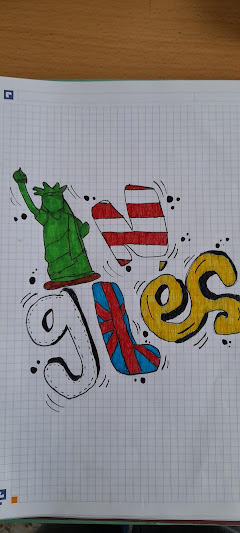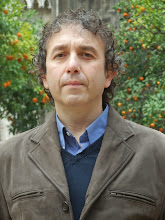PHRASAL VERBS (WordrReference.com)
Phrasal
verbs are verbs followed by one or more adverb particles. Common adverb
particles are: ABOUT, ACROSS, AWAY, BACK, IN, OFF, ON, OUT, OVER, PAST and UP.
This
adverb particles join with the verb to give a different, non-literal meaning.
COME (to arrive)
Winter is coming
COME ACROSS (To meet someone or find something
by chance)
I came across some old photos in a box
COME BACK (To return to a place)
They came back very late last night
COME FROM (To be or derive from)
My parents come from Ireland
1) TRANSITIVE PHRASAL
VERBS WHICH CAN BE SEPARATED
The
direct object can be placed either between the verb and the particle or after
the particle.
I took
my gloves off I
took off my gloves
If
the direct object is a pronoun, it always comes between the verb and the
particle.
Put them on Take
it off
BRING UP SACAR
EL TEMA
Don't bring that subject again
CARRY OUT LLEVAR
A CABO
The company is carrying out a survey on mobile
phones
CLOSE DOWN CERRAR
DEFINITIVAMENTE
The authorities closed the restaurant down
because of the rats
FILL IN RELLENAR
Shall I fill in the application form?
FIGURE OUT HACERTE UNA IDEA
You can figure the rest out later
GIVE AWAY REGALAR
/ DONAR
Give your books away if you don't need them any
more
GIVE OUT REPARTIR
The teacher gave the exam papers out
HAND IN ENTREGAR
The students handed in their tests when they
had finished
LOOK UP BUSCAR (EN UN DICCIONARIO)
Look up the words in your dictionary
PUT DOWN ECHAR
POR TIERRA
Don't put yourself down. You are a very good
student
PUT OFF POSPONER
We asked the teacher to put the test off until
the following week
PUT ON PONERSE
wait for me. I have to put my coat on
PUT OUT APAGAR
Put out your cigarette, you can't smoke here
TRY ON PROBAR
Why don't you try these jeans on?
TURN DOWN / UP BAJAR
/ SUBIR VOLUMEN
Please, turn the music down / up since it is
too loud / low
TURN OFF / ON APAGAR
/ ENCENDER
Turn off / on the TV when you leave / come
2) TRANSITIVE PHRASAL
VERBS WHICH CANNOT BE SEPARATED
The
direct object must be placed after the particle even if the direct object is a
pronoun.
APPEAL TO APELAR
he tried appealing to her better nature
ASK AFTER PREGUNTAR
POR
Louise asked after you today, she was very concerned
about you
BELIEVE IN CREER
EN
Do you believe in ghosts?
CALL FOR RECOGER
I will call for you on my way to the cinema
COME ACROSS ENCONTRAR
POR CASUALIDAD
I came across some valuable antiques in my
attic last week
DEAL WITH ARREGLÁRSELAS
How do young people deal with bullying?
GET INTO METERSE
They got into a fight on their way home
GET OVER RECUPERARSE
She cannot get over the death of her cat
GO OVER ANALIZAR
We went over the questions before the exam
JOIN IN APUNTARSE
The new student joined in the activities even
though he was very shy
LOOK AFTER CUIDAR
I'm looking after my neighbours' children
tonight
LOOK AROUND ECHAR
UN VISTAZO
Let's look around the old town tonight
LOOK INTO INVESTIGAR
The police are looking into robberies in the
neighbourhood
PICK ON METERSE
CON
The older boys are always picking on me
RUN INTO CHOCAR
He ran into an old friend in the supermarket
TAKE AFTER PARECERSE
Look at Ellie, she really takes after her
mother
3) INTRANSITIVE
PHRASAL VERBS
They
don't have an object so the verb and the particle cannot be separated.
BREAK DOWN ESTROPEARSE
The car broke down on the motorway
BREAK OUT ESTALLAR
The Second War World broke out in 1939
COME BACK REGRESAR
What time did you come back last night?
COME IN ENTRAR
May I come in?
COME OUT SALIR
The seventh Harry Potter book came out in 2007
COME OVER VENIR
/ DEJARSE CAER
Will you come over to my place?
FALL OUT PELEARSE
Will and I are always falling out
FIT IN ENCAJAR
She tried to fit in the group, but they were much
older than her.
GET UP LEVANTARSE
You don't need to get up early at the weekend
GO BACK REGRESAR
I want to go back to the shop and buy that
dress
GO ON OCURRIR
We stopped to se what was going on the park
GROW UP CRECER
Children grow up so quickly
KEEP ON CONTINUAR
Let's keep on working. We haven't finished yet
LOOK OUT CUIDADO
Look out! There is a car coming!
SPLIT UP ROMPER
Daniel and Rachel are always splitting up
WAKE UP DESPERTAR
I woke up at seven o'clock this morning
4) PHRASAL VERBS WITH
THREE PARTS
They
consist of the verb and TWO particles. The verb and the particles cannot be
separated.
CATCH UP WITH PONERSE
AL DÍA
She missed school for a month and had to catch
up with the rest of the class
COME UP AGAINST VÉRSELAS
CON
I have come up against a problem that I cannot
solve
COME UP WITH ELABORAR
/ CONSEGUIR
Have you come up with an answer to my problem
yet?
DROP OUT OF ABANDONAR
My friend dropped out of school last year
FACE UP TO AFRONTAR
You really should face up to your responsibilities
FEEL UP TO TENER LA CONDCIÓN DE
I don't feel up to going to work today
GET AWAY WITH SALIRSE
CON LA SUYA
Don't expect to get away with cheating in exams
GET BACK TOGETHER RECONCILIARSE
My boyfriend and I got back together last night
GET ON WITH LLEVARSE
BIEN
She doesn't get on with the people in her class
LOOK DOWN ON MENOSPRECIAR
Some people look down on immigrants
LOOK FORWARD TO DESEAR
I'm looking forward to going to Paris at the
weekend
LOOK UP TO ADMIRAR
Andrew looks up to organizations that fight for
a better world
MAKE SURE OF ASEGURARSE
Make sure of the direction before starting your
journey
PUT UP WITH AGUANTAR
We shouldn't put up with antisocial behaviour
RUN OUT OF AGOTARSE
Go to the shop. We have run out of milk
STAND UP FOR DEFENDER
He must learn to stand up for himself
5) PHRASAL VERBS WHICH
CHANGE THEIR MEANING
Some
phrasal verbs can be transitive or intransitive and their meaning changes
depending on the context.
MAKE UP
a) TRANSITIVE INVENTAR
Did you make that story up?
b) INTRANSITIVE RECONCILIARSE
They still haven't make up. It's been a week
since that argument
TAKE OFF
a) TRANSITIVE DESNUDARSE
He sat down on the sofa and took his shoes off
b) INTRANSITIVE DESPEGAR
My plane takes off at seven o'clock
TURN UP
a) TRANSITIVE AUMENTAR
Can you turn the volume up on the TV up,
please?
b) INTRANSITIVE APARECER
SIN AVISAR
Don't book in advance. Just turn up and you
will get a table




